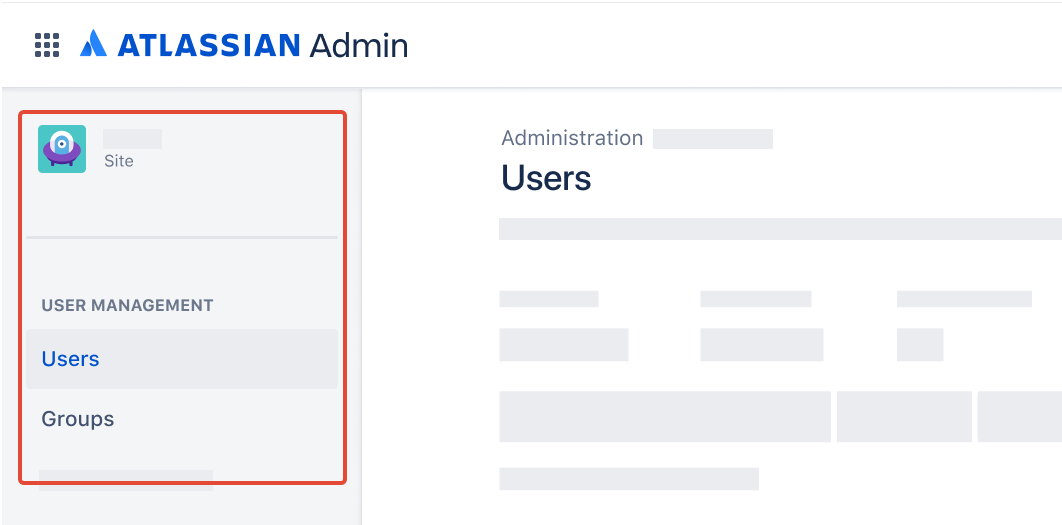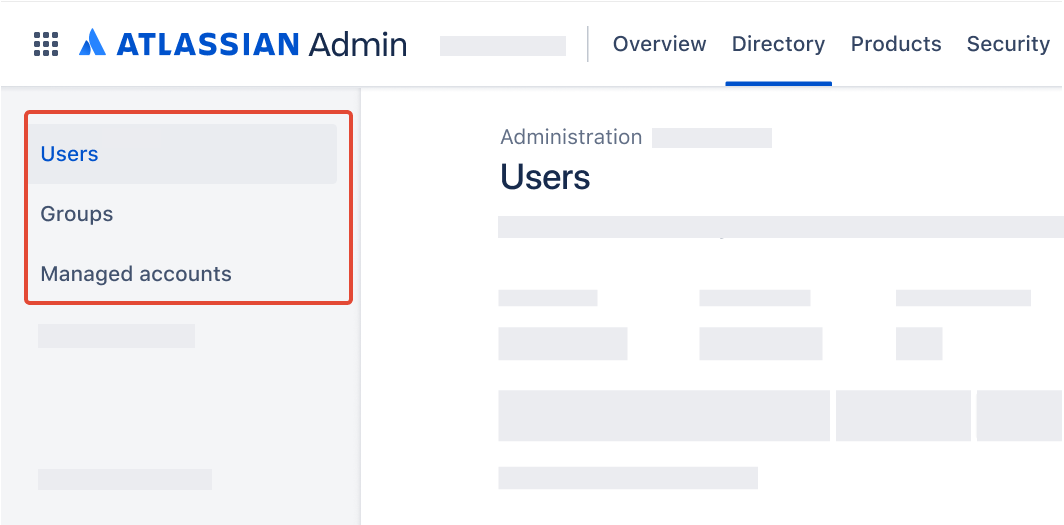Track storage and move data across products
Which user management experience do you have?
To check, go to your organization at admin.atlassian.com and select Directory. If the Users and Groups lists are found here, then you are using the centralized user management. Learn more about the centralized user management
We’ll note these changes in the support documentation below.
Original | Centralized |
As a site administrator or organization admin, Users is found under Product site.  | As an organization admin, Users is found under Directory tab.  |
Jira and Confluence products all come with their own file storage space. This is the case even if you have more than one instance of the same product. For example, if you have two Confluence instances from two sites, each will have its own storage. This storage is primarily used for attachments.
The amount of storage available to a product depends on its plan. See storage allowances for:
How do I track storage for each product?
You must be a site admin to track storage.
To track storage for your site:
Go to admin.atlassian.com. Select your organization if you have more than one.
This step is different depending on your user management experience:
- Original: Select the site's name and URL to open the Admin for that site.
- Centralized: Select Products then select the site from the left hand side.Under Site settings, select Storage.
For each product, you’ll see the amount of storage used and the amount remaining (if it’s not unlimited).
What happens if I exceed my storage limit?
When you reach your storage limit on Jira or Confluence, you’ll need to upgrade to a higher plan or delete content to free up storage space. We won’t remove any of your data, but some actions in Jira and Confluence will become restricted until you upgrade or free up storage.
Can I increase my storage limit?
Each Jira and Confluence plan comes with a set amount of storage. Currently, the only way to increase your storage is to upgrade your plan.
What happens to my storage and stored items if I move from a Premium or Enterprise plan to a Standard or Free plan?
If you exceed a storage limit, nothing will happen to your stored items at this time, as long as usage is in accordance with our acceptable use policy.
What happens to Free plan products if they're inactive for too long?
Confluence
Confluence sites on the Free plan will be deactivated after 120 days of inactivity. To prevent your site being deactivated, just log in and view any Confluence page—that’ll count as activity and reset the 120-day clock.
Jira
If all the Jira Cloud products on your site are on a Free plan, your Jira Cloud products will be deactivated after 120 days of inactivity. If any Jira Cloud product on your site is on a paid plan, this doesn’t apply to that site.
Activity is simply logging in and viewing any page within a Jira product on your site. For example, if you log in and view a dashboard, report, Jira admin screen, or issue, any of those would count as activity. To keep your site active, log in, and view something to restart the 120 days.
Read more about deactivating inactive products and other limitations in Free plans.
Where is data stored?
See the cloud hosting infrastructure page.
How often is data backed up?
Automated Amazon Relational Database Service (RDS) backups are generated daily and retained for 30 days to allow for point-in-time data restoration. RDS snapshots are encrypted at rest.
Can Atlassian’s RDS backups be used to roll back changes?
We cannot use our RDS backups to roll back changes. These include changes such as fields overwritten using scripts, or deleted issues, projects, or sites.
This is because our data isn’t stored in a single central database. Instead, it is stored across many micro services, which makes rolling back changes a risky process.
To avoid data loss, we recommend making regular backups. For how to do this, see our documentation:
Confluence – Create a site backup
Jira products – Exporting issues
Does Atlassian archive or delete my data?
We don’t archive or delete data for any of your active subscriptions.
What security procedures are in place to protect my data?
See the Atlassian security practices page.
How does cancellation impact my data?
What happens if I miss a payment?
If payment fails for your Atlassian product subscription, we’ll send you emails to let you know. If we don’t receive payment within 15 days, your subscription will be canceled and your site will be deactivated, which means your product enters a data retention period.
What happens if I cancel my subscription?
If you cancel your product subscription, we won’t process any further subscription renewals. After your subscription period ends, you’ll be able to access your site for 15 more days. Your site will then be deactivated, and your products will enter a data retention period.
Data retention period
The length of your product’s data retention period will depend on the plan and billing system. At the end of this data retention period, your product’s data will be permanently deleted and cannot be recovered. If you want immediate deletion of your data, you can submit a request.
Plan | Data retention period |
|---|---|
Trials | 15 days |
Free, Standard, Premium or Enterprise plan | 60 days* *For Free plans managed by the original billing system, data is only retained for 15 days. Learn how to tell the difference |
Reactivating a canceled site
You can reactivate a subscription any time within the data retention period. See Cancel a subscription
Google Apps Marketplace data
We won't delete any data that's stored in the Google Apps Marketplace, such as users or information in your Google Apps database, Google Docs, Gmail messages, Google Calendar entries, Google Chat, or Google Sites.
What happens if I delete or cancel one product on an Atlassian product subscription?
Individual products on Atlassian product subscriptions can be removed in a few ways, as noted per product below.
Confluence
To remove Confluence, you can delete it from your Atlassian product subscription. This will immediately delete your Confluence data and remove Confluence access from all users. No further Confluence renewals will be processed.
Jira
To remove a Jira product, you can unsubscribe from it on your Atlassian product subscription. All users will immediately lose access to the product and no further renewals will be processed.
If you unsubscribe from one Jira product (e.g. Jira) and retain another (e.g. Jira Service Management), your Jira data will be retained. If you unsubscribe from all Jira products on your site, your Jira data will be deleted immediately.
What happens at the end of the evaluation period for an individual product on an annual Atlassian product subscription?
Evaluations for individual products on an annual Atlassian product subscription last for 30 days. If we don’t receive payment, you will be unsubscribed from Jira and Confluence products 17 days after the payment due date, at which point users will lose access to Jira and Confluence.
Confluence data will be deleted 15 days after the product is unsubscribed. If your evaluation for one Jira product (e.g. Jira Service Management) ends but you still have other Jira products (e.g. Jira) on your annual subscription, your Jira data will not be deleted. Jira data will only be deleted if you unsubscribe from all Jira products.
Your data can't be recovered after it's deleted. We strongly recommend creating a Confluence site backup or Jira site backup, as noted below.
Import data
You can bring in existing information, like Jira products issues or Confluence spaces, so that you don't need to start from scratch. Choose the type of import you need to complete for more info.
Jira products
Confluence
Export data
As with importing data, you'll export content data from each specific cloud product you're using. You can also export user data from Atlassian admin hub.
Jira products
Confluence
Was this helpful?